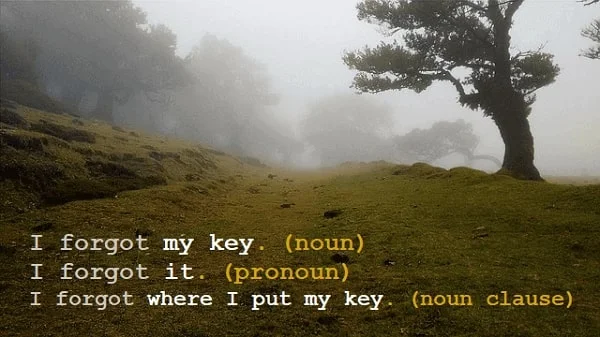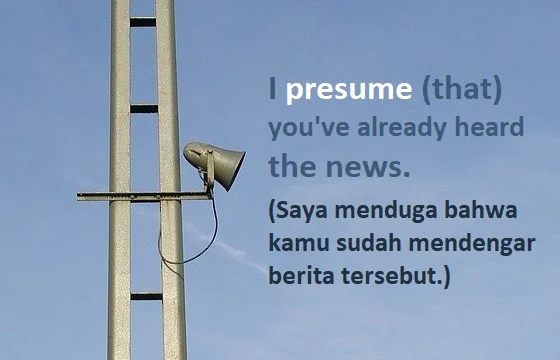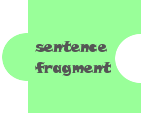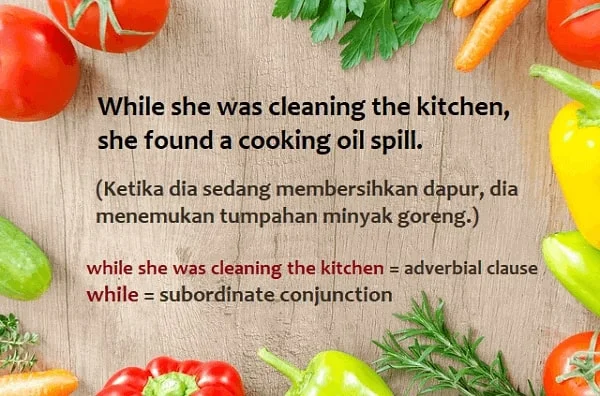Pengertian Noun Clause
Noun Clause adalah dependent clause yang berfungsi sebagai noun (kata benda). Karena berfungsi sebagai kata benda, clause ini dapat berfungsi sebagai komponen kalimat seperti: subject, object of verb, object of preposition, dan subject complement serta dapat digantikan dengan pronoun “it“.
Table of Contents: |

Lihat juga:
- adjective clause
- adverbial clause
- noun phrase
- compound noun
- independent clause
- comparative clause
- defining clause
- essential clause
- main clause
- reduced adverb clause
Rumus Noun Clause
Noun clause dapat diawali oleh marker atau subordinator berupa question word, if atau whether, dan that.
| if/whether/that/ question word + S + V + … |
|---|
Noun Clause Marker
-
question word
Question word yang digunakan pada noun clause yaitu:
- what(ever)
- what (time, kind, day, etc)
- who(ever)
- whose
- whom(ever)
- which(ever)
- where(ever)
- when(ever)
- how (long, far, many times, old, etc)
-
if/whether
Biasanya if atau whether digunakan untuk kalimat jawaban dari pertanyaan yes-no question atau bentuk reported speech dari pertanyaan tersebut.
-
that
Biasanya that-clause untuk mental activity. Berikut daftar verb pada main clause yang biasanya diikuti that-clause:
- assume
- believe
- discover
- dream
- guess
- hear
- hope
- know
- learn
- notice
- predict
- presume
- prove
- realize
- suppose
- suspect
- think

Contoh Kalimat Noun Clause dengan Berbagai Noun Marker dan Perannya
-
question word
- What she cooked was delicious.
(Apa yang dia masak lezat.) subject - I want to know how he was in real.
(Saya ingin tahu bagaimana dia aslinya.) direct object - There’s no reward for whoever finishes first.
(Tidak ada hadiah untuk siapa pun yang selesai lebih dulu.) object of preposition - I listened carefully to what she said.
(Saya mendengarkan dengan cermat dengan apa yang dia katakan.) object of preposition - The girl comes from where many people live in poverty.
(Perempuan itu berasal dari tempat dimana orang-orang hidup dalam kemiskinan.) object of preposition
- What she cooked was delicious.
-
if/whether
- A: Where does Andy live?
(Dimana Andy tinggal?)
B: I wonder if he lives in West Jakarta.
(Saya bertanya-tanya apakah dia tinggal di Jakarta Barat.) direct object - A: Does Andy live on Banana Street?
(Apakah Andy tinggal di Jalan Pisang?)
B1: I don’t know if he lives on Pisang Street or not.
(Saya tidak tahu jika dia tinggal di jalan Pisang.) direct object
B2: I don’t know whether or not he lives on Banana Street.
(Saya tidak tahu jika dia tinggal di jalan Pisang atau tidak.) direct object - Sarah wanted to know if he lived on Banana street.
(Sarah ingin tahu apakah dia tinggal di Jalan Pisang.) reported speech, direct object
- A: Where does Andy live?
-
that
- That today is his birthday is not right.
(Bahwa hari ini ulang tahunnya tidak benar.) subject - I think that the group will arrive in an hour.
(Saya pikir rombongan itu akan tiba dalam satu jam.) direct object - Many people had proved that the method was ineffective.
(Banyak orang telah membuktikan bahwa metode tersebut tidak efektif.) direct object - Diana believes that her life will be happier.
(Diana percaya hidupnya akan lebih bahagia.) direct object - The fact is that more than a hundred million people live in the ten largest cities in the world.
(Faktanya adalah lebih dari seratus juta orang tinggal di sepuluh kota terbesar di dunia.) subject complement - We were worried that she couldn’t recover from divorce.
(Kami khawatir dia tidak dapat membaik dari perceraian.) adjective complement
- That today is his birthday is not right.
Word Order pada Noun Clause
Word order (subject mendahului verb) digunakan pada noun clause yang diawali dengan question word, meskipun bagian main clause berupa pertanyaan.
Contoh Word Order Noun Clause
- Can we imagine how old is he? [salah]
- Can we imagine how old he is? [benar]
- Will you explain where did you go? [salah]
- Will you explain where you went? [benar]
- I can imagine what did the man say. [salah]
- I can imagine what the man said. [benar]
- No one knew whose chocolate was on the table. [benar (prepositional phrase setelah be)]
Reduced Noun Clause
Hanya clause dengan subordinator “that” yang dapat direduksi. Namun tidak untuk that-clause yang berada di awal kalimat yang berfungsi sebagai subject.
Contoh Reduced Noun Clause
- I hope
thathe is doing well. [benar]
(Saya berharap bahwa dia baik-baik saja.) Thatshe refused to sell her house is understandable. [salah]
(Bahwa dia menolak untuk menjual rumahnya itu dapat dimengerti.)- My dream is
thatpeople will find a way to connect with the poor. [benar]
(Impian saya orang-orang akan dapat menemukan cara untuk berhubungan dengan orang miskin.)
Tense pada Noun Clause
Tense pada noun clause dan main clause seringkali berbeda. Berikut penjelasan kombinasi dan contoh kalimatnya.
main clause + noun clause
-
present tense + future tense
jika action/state dilakukan/terjadi kemudian
- I hope that the trip will be fun and unforgetable.
(Saya berharap bahwa kunjungan tersebut akan menyenangkan dan tak terlupakan.)
jika action/state masih diprediksi akan terjadi di masa depan
- Many dream that solar energy will fully replace fossil fuels.
(Banyak yang bermimpi bahwa tenaga surya akan menggantikan sepenuhnya bahwan bakar fosil.)
- I hope that the trip will be fun and unforgetable.
-
present tense + present tense
jika action/state dilakukan/terjadi pada saat yang bersamaan dengan main clause
- I guess that she is sleeping in the library now.
(Saya kira dia sedang tidur di perpustakaan sekarang.)
jika merupakan kebenaran umum atau fakta
- We know that atlantic salmon migrates to the ocean to feed and grow.
(Kita tahu bahwa salmon atlantik bermigrasi ke lautan untuk makan dan tumbuh.)
- I guess that she is sleeping in the library now.
-
present tense + past tense
jika action/state telah dilakukan/terjadi sebelum action/state pada klausa utama
- I think that the bread was baked three days ago.
(Saya pikir roti itu dipanggang tiga hari lalu.)
- I think that the bread was baked three days ago.
-
past tense + future tense
jika action/state masih diprediksi akan terjadi di masa depan
- The scientist believed that there will be a cure for HIV.
(Ilmuan tersebut percaya bahwa akan ada penyembuhan bagi HIV.)
- The scientist believed that there will be a cure for HIV.
-
past tense + present tense
jika action/state dilanjutkan sampai sekarang
- I discovered that creating a website is not easy.
(Saya menemukan bahwa membuat website itu tidak mudah.)
jika action/state jika merupakan kebenaran umum atau fakta
- The children learned that the earth is not square.
(Anak-anak itu belajar bahwa bumi itu tidak persegi.)
- I discovered that creating a website is not easy.
-
past tense + past future
jika action/state dilakukan/terjadi kemudian
- The class assumed that the teacher would be late.
(Kelas itu berasumsi bahwa guru itu akan terlambat.)
- The class assumed that the teacher would be late.
-
past tense + past tense
jika action/state dilakukan secara bersamaan dengan action/state pada klausa utama
- She supposed that her friend was walking to the post office.
(Dia menduga bahwa temannya sedang berjalan ke kantor pos.)
- She supposed that her friend was walking to the post office.
-
past tense + past perfect
jika action/state pada noun clause telah dilakukan/terjadi sebelum action/state pada main clause
- He heard that you had written a book.
(Dia mendengar bahwa kamu telah menulis sebuah buku.)
- He heard that you had written a book.
10 Contoh Soal Noun Clause Pilihan Ganda
Noun clause merupakan subordinate clause yang berfungsi sebagai noun (kata benda). Klausa ini dimulai dengan question word (antara lain: what, who, whose, whom, which, where, when, dan how), if/whether, atau that.
Pilihlah noun clause yang tepat untuk melengkapi kalimat di bawah ini dengan mengetik a atau b.
-
She wanted to know …
- if I had applied for the scholarship
- if had I applied for the scholarship
Your answer:
-
… is unacceptable.
- What do they always do in the classroom or lab
- What they always do in the classroom or lab
Your answer:
-
I predict …
- that will she be able to make decisions in an emergency situation
- that she will be able to make decisions in an emergency situation
Your answer:
-
Astri talks about her early life experiences with …
- whoever will listen
- will whoever listen
Your answer:
-
We wonder …
- if does he work at Philadelphia General Hospital
- if he works at Philadelphia General Hospital
Your answer:
-
The teacher asked me …
- who Niels Bohr was
- who was Niels Bohr
Your answer:
-
I don’t know …
- how much does he make a month
- how much he makes a month
Your answer:
-
The worker is afraid …
- that will he get fired
- that he will get fired
Your answer:
-
… is awesome.
- That the girl can speak English fluently
- That can the girl speak English fluently
Your answer:
-
The reality is …
- that does everybody need somebody sometimes
- that everybody needs somebody sometimes
Your answer:
Javascript diperlukan untuk menjalankan quiz ini.
Lihat juga:
 Defining/Non-Defining Relative Clause: Pengertian dan Contoh
Defining/Non-Defining Relative Clause: Pengertian dan Contoh
- Agreement Bahasa Inggris: Pengertian dan Contoh
 Sentence Fragment Bahasa Inggris: Pengertian dan Contoh
Sentence Fragment Bahasa Inggris: Pengertian dan Contoh
 Adverbial Clause: Pengertian dan Contoh Kalimat
Adverbial Clause: Pengertian dan Contoh Kalimat
- If I were atau If I was yang Benar?
References:
- Using Clauses as Nouns, Adjectives, and Adverbs. http://www.writingcentre.uottawa.ca/hypergrammar/claustyp.html. Accessed on September 30, 2012.
- Noun Clauses. http://faculty.deanza.edu/flemingjohn/stories/storyReader$23. Accessed on September 30, 2012.
- Meaning of “suppose” in the English Dictionary. https://dictionary.cambridge.org/dictionary/english/suppose. Accessed on October 13, 2018.
- Meaning of “discover” in the English Dictionary. https://dictionary.cambridge.org/dictionary/english/discover. Accessed on October 13, 2018.




i’ll give my best this time.. fighting!
Thank you,,, I will do my best for this.
clear
thankyou, its help me to understand.
You’re very welcome 😀